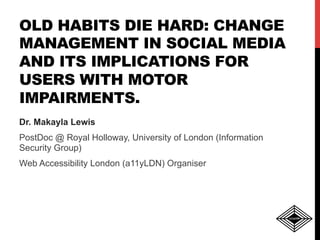Old Habits Die Hard: Change Management in Social Media And Its Implications For Users With Motor Impairments
- 1. OLD HABITS DIE HARD: CHANGE MANAGEMENT IN SOCIAL MEDIA AND ITS IMPLICATIONS FOR USERS WITH MOTOR IMPAIRMENTS. Dr. Makayla Lewis PostDoc @ Royal Holloway, University of London (Information Security Group) Web Accessibility London (a11yLDN) Organiser
- 2. WHO AM I? ŌĆóŌĆ» PhD in Human-Computer Interaction (Cerebral Palsy, Online Social Networks and Change) - Sept 2012 ŌĆóŌĆ» PostDoc on Cyber Security Cartographies (CySeCa) Project ŌĆō Since Nov 2012 ŌĆóŌĆ» EssentiallyŌĆ” HCI User Research who hearts Visual Storytelling Methods.
- 3. MOTIVATION Images have been removed please view PhD Thesis for personal moitvation http://openaccess.city.ac.uk/3011/
- 4. CP STORIES Images have been removed please view PhD Thesis for CP personas: http://openaccess.city.ac.uk/3011/
- 5. OSN CHANGE & CP Frequent and abrupt OSN changes i.e. UI and task structure ŌĆóŌĆ» Confusion, task relearning, personal & use confidence, introduction of poor UI features and or removal of accessible features. ŌĆóŌĆ» OSN use and independence is reduced by change ŌĆóŌĆ» Support individuals are often required to resolve problems or assist use ŌĆóŌĆ» This is often felt inappropriate by adult with CP.
- 6. MONITORING CHANGE Facebook 431 Blog Comments and 13,323 Likes Facebook 427,925 Tweets Using #NewTwitter ŌĆóŌĆ» Overview of users reactions to change within the user interface, this was done by investigating tweets or comments during peaks. ŌĆóŌĆ» In-depth look at users reactions to change over a 6-month period using an event-sampling method where the first 100 comments mentioning the change on a given day were collected & analysed.
- 7. ANALYZING CHANGE #NewTwitter Global Peaks #NewTwitter Sentiment Analysis #NewTwitter Change Acceptance
- 8. EXPLORE Images have been removed please view PhD Thesis for Methodology: http://openaccess.city.ac.uk/3011/
- 9. SURVEY ŌĆ£Facebook are never thinking about us users. We donŌĆÖt need this feature, I donŌĆÖt know why theyŌĆÖve done this. Why have I got it but my friends donŌĆÖt. F*** this how do I opt-out?ŌĆØ Similar response from Twitter users with CP.
- 10. 5 STEP PROCESS FOR OSN CHANGE
- 11. UPDATEŌĆ” 2013 ŌĆóŌĆ» Flickr ŌĆō Excellent (Detected: Step 3 Persuade (Overlap) and Step 4 (Refreeze i.e. Active Support) and 5 (Consultation) ŌĆóŌĆ» Twitter ŌĆō Good (Detected: Step 1 Before (Limited Knowledge), Step 2 Unfreeze (Short Roll Out) and 3 (Overlap)) 2014 ŌĆóŌĆ» Twitter ŌĆō Not So Good (Slowly Returning To Old Habits (#TwitterLayout Detected: Step 2 Unfreeze (Short Roll Out) and 3 (Overlap)) ŌĆóŌĆ» Flickr ŌĆóŌĆ» Excellent (Early 2014 ŌĆō Detected: Step 1 and 2) ŌĆóŌĆ» Good (April 2014 ŌĆō Returning To Old Habits: No Steps 1, 2 or 3) AND Facebook, Facebook, FacebookŌĆ” Just DonŌĆÖt Give A Monkey Uncle.
- 12. PLEASE CONSIDER MOTOR IMPAIRED USERS WHEN YOU CHANGE YOUR ŌĆ£SOCIALŌĆØ WEBSITES. OSN CHANGE ISNŌĆÖT THE BE ALL AND END ALL THIS METHOD HAS RECENTLY BEEN INTRODUCED WITHIN THE CITIZEN SCIENCE SPACE (ZOONIVERSE)
- 13. THANK YOU! @maccymacx makayla.lewis@rhul.ac.uk www.makaylalewis.co.uk *FREE* PhD Thesis (including CSUN, DIS AND ASSETS papers): http://openaccess.city.ac.uk/3011/













